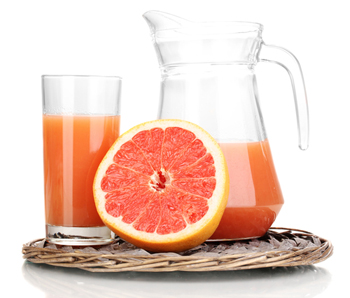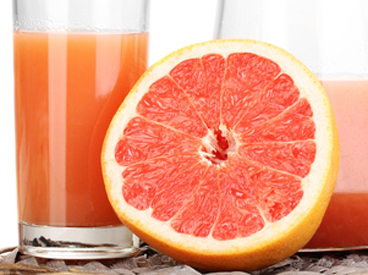
A daily glass of grapefruit juice more than triples the benefit of taking an anti-cancer drug by itself, according to a new clinical trial funded by the National Institutes of Health. The combination could help patients avoid side effects associated with high doses of the drug and reduce the cost of the medication.
The preliminary study, published in Clinical Cancer Research, shows that eight ounces of grapefruit juice a day can slow the body’s metabolism of a drug called sirolimus, which has been approved for transplant patients but may also help many people with cancer.
“Grapefruit juice, and drugs with a similar mechanism, can significantly increase blood levels of many drugs,” says study director Ezra Cohen, MD, a cancer specialist at The University of Chicago Medicine, “but this has long been considered an overdose hazard. Instead, we wanted to see if grapefruit juice can be used in a controlled fashion to increase the availability and efficacy of sirolimus.”
Grapefruit juice’s pharmaceutical prowess stems from its ability to block intestinal enzymes that break down sirolimus and several other drugs (ask your doc and pharmacist if your pills interact with the juice). In Dr. Cohen’s study, participants who drank eight ounces of grapefruit juice a day increased their sirolimus levels by 350 percent.
“This is the first cancer study to harness this drug-food interaction,” the authors note.
Levels of sirolimus-inactivating enzymes in the body can vary, so testing the amount a patient produces may help predict his or her response to grapefruit juice. However, the ingredients found in grapefruit juices may vary even more than patients’ enzyme levels, Dr. Cohen says.
An early version of the study used canned grapefruit juice, generously donated by a Chicago-based grocery chain. But tests of the product found it lacked the necessary active ingredients. So the researchers shifted to a frozen concentrate product supplied by the Florida Department of Citrus. Further research is needed to confirm the promising findings.
Become a Saturday Evening Post member and enjoy unlimited access. Subscribe now



